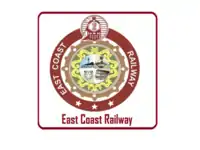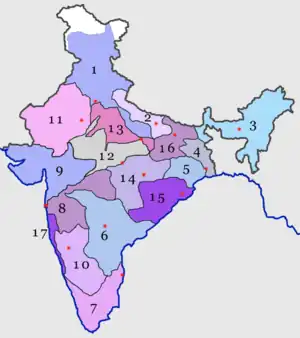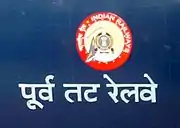East Coast Railway zone
The East Coast Railway (abbreviated ECoR) is one of the 19 railway zones of Indian Railways. It came into existence on 1 April 2003. The headquarters of the zone are at Bhubaneswar, Odisha
 | |
 15-East Coast Railway | |
| Overview | |
|---|---|
| Headquarters | Bhubaneswar |
| Locale | Odisha Chhattisgarh Andhra Pradesh |
| Dates of operation | April 1, 2003– |
| Predecessor | South Eastern Railway Zone |
| Technical | |
| Track gauge | 5 ft 6 in (1,676 mm) |
| Electrification | 25 kV 50 Hz AC |
| Other | |
| Website | eastcoastrail |
History
Consequent upon the parliament's approval, East Coast Railway was the first of the seven new zones to be inaugurated by the then Prime Minister of India H. D. Deve Gowda on 8 August 1996. The Officer-on-Special Duty took over charge of the newly declared Zone on 16 September 1996. Initially, only one division namely Khurda Road was attached to this railway.
Subsequently, the zone became fully operational on 1 April 2003. The Waltair division was notified to be bifurcated from the East Coast Railway zone on 27 February 2019. The Odisha section of Waltair division will constitute the new Rayagada division, while the Andhra Pradesh section will be a part of the South Coast Railway zone upon operationalization.[1]
Divisions
The geographical jurisdiction of East Coast Railway zone extends over three states encompassing almost all of Odisha and Bastar, Mahasamund and Dantewada districts of Chhattisgarh and a minor part [Palasa, Sompeta and seven other stations] of Srikakulam district in Andhra Pradesh. The zonal headquarters is at Bhubaneswar in Odisha.
The zone has three divisions: Sambalpur, Khurda Road and Waltair.
The Rayagada railway division has been proposed to succeed a section of the existing Waltair division which will remain in the East Coast Railway zone upon bifurcation.[2]
Electrification
As of 31 December 2021, it is one of the three 100% electric railway zones in India.[3] The East Coast Railway line integrated with the commissioned Howrah-Chennai electrified trunk route on 29 November 2005. There was a missing link between Kharagpur and Visakhapatnam stations and all trains from Howrah towards Chennai side had to undergo a locomotive change from electric to diesel at Kharagpur and vice versa at Visakhapatnam in order to pass through Odisha. Even trains from New Delhi such as the Bhubaneswar Rajdhani had to undergo the change at Kharagpur. This frequent loco change on a trunk route became a time-consuming and inconvenient process. With electrification along the 765 km Kharagpur-Visakhapatnam stretch, trains got speeded up and the need for double headed diesels for high speed express trains was eliminated thus saving on diesel consumption and a cleaner travel. Additionally the line branching off Khurda road towards Puri was also electrified. Gradually the Cuttack-Angul line, Cuttack-Paradeep line and branch line from Jakhapura towards Barbil got electrified too.
Major railway stations
The major railway stations in the entire zone are Bhubaneswar, Cuttack, Chatrapur, Puri, Sambalpur, Khurda Road, Balugaon, Rayagada, Brahmapur, Angul, Dhenkanal, Bhadrak, Balangir,Bargarh,Jajpur Keonjhar Road, Titilagarh,Kesinga, Lanjigarh, Koraput, Mahasamund, Jagdalpur, Kendujhargarh, Palasa and Barbil.
Most of the major stations fall in the state of Odisha, Chhattisgarh.
Gallery
 East Coast Railway written in Devanagari
East Coast Railway written in Devanagari
Rail infrastructure
- Electric Loco Shed – Angul
- Carriage Repair Workshop – Mancheswar, Bhubaneswar
- MEMU Shed – Khurda Road
Routes
East Coast Railway zone has about 273 railway stations with a track length of 5214 km spread as follows:-
| Division | Total kilometre | Electrified kilometre | ||
|---|---|---|---|---|
| Track | Route | Track | Route | - |
| Total | 5,214 | 2,677 | 3,371 | 1,543 |
Railway lines
ECoR zone has below tracks. All are 5 ft 6 in (1,676 mm) broad gauge. The sections are:-
- Bhadrak-Bhubaneswar-Khurda Road- Double Electrified BG line [92 Railway stations]
- Talcher-Cuttack Double Electrified BG line [21 Railway stations]
- Titlagarh Junction-Mahasamund Single Electrified BG line [15 Railway stations] (Electric doubling of this line is currently underway)
- Cuttack-Paradip Double Electrified BG line [10 Railway stations]
- Khurda road-Puri Double Electrified BG line [11 Railway stations]
- Sambalpur Junction-Talcher Single Electrified BG line [16 Railway stations](Electric doubling of this line is currently underway)
- Titlagarh Junction-Sambalpur Junction Single Electrified BG line [16 Railway stations] (Electric doubling of this line is currently underway)
- Sambalpur Junction-Jharsuguda Junction Double Electrified BG line [10 Railway stations]
- Rayagada-Koraput Single Electric BG line [15 Railway stations]
- Naupada Junction-Gunupur Single Diesel BG line [14 Railway stations]
- Jakhapura Junction-Banspani Single Electrified BG line [17 Railway stations] (Electric doubling of this line is currently underway)
Loco sheds
External links
See also
- All India Station Masters' Association (AISMA)
- Zones and divisions of Indian Railways
- Indian Railway Signal Maintainers Union (IRSTMU)
- South Coast Railway
References
- "QUOTE ON ESTABLISHMENT OF SOUTH COAST RAILWAY _ RAILWAYS CLARIFIES". eastcoastrail.indianrailways.gov.in. 28 September 2022.
- "Delays dog new railway zone". The Hindu. 27 December 2021. Retrieved 9 May 2022.
- "Major Leap towards 100% Electrification: 3 Railway Zones of Indian Railways, i.e, West Central Railway, Kolkata Metro and East Coast Railway have been fully electrified, reducing carbon footprints". Twitter.com. Retrieved 3 February 2022.